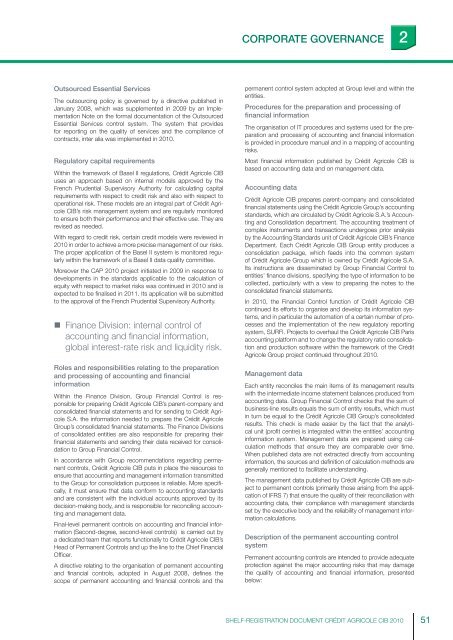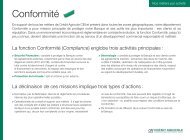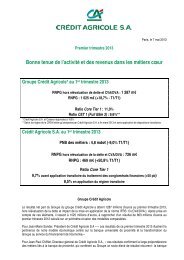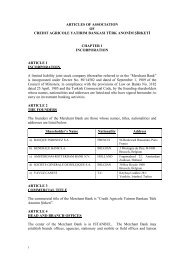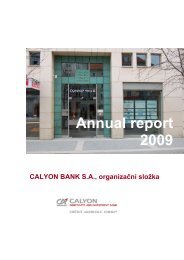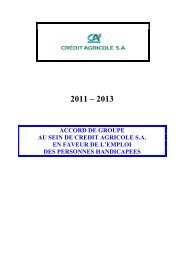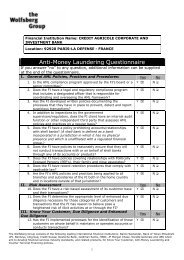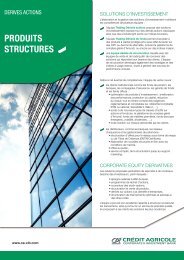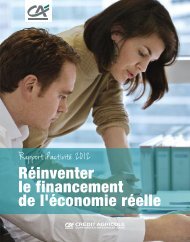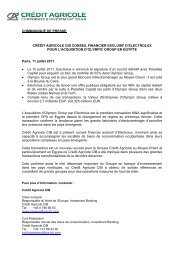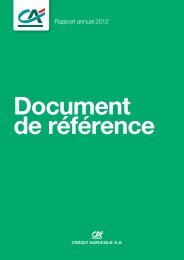ourexpertise - Crédit Agricole CIB
ourexpertise - Crédit Agricole CIB
ourexpertise - Crédit Agricole CIB
Create successful ePaper yourself
Turn your PDF publications into a flip-book with our unique Google optimized e-Paper software.
CORPORATE GOVERNANCE 2Outsourced Essential ServicesThe outsourcing policy is governed by a directive published inJanuary 2008, which was supplemented in 2009 by an ImplementationNote on the formal documentation of the OutsourcedEssential Services control system. The system that providesfor reporting on the quality of services and the compliance ofcontracts, inter alia was implemented in 2010.Regulatory capital requirementsWithin the framework of Basel II regulations, <strong>Crédit</strong> <strong>Agricole</strong> <strong>CIB</strong>uses an approach based on internal models approved by theFrench Prudential Supervisory Authority for calculating capitalrequirements with respect to credit risk and also with respect tooperational risk. These models are an integral part of <strong>Crédit</strong> <strong>Agricole</strong><strong>CIB</strong>’s risk management system and are regularly monitoredto ensure both their performance and their effective use. They arerevised as needed.With regard to credit risk, certain credit models were reviewed in2010 in order to achieve a more precise management of our risks.The proper application of the Basel II system is monitored regularlywithin the framework of a Basel II data quality committee.Moreover the CAP 2010 project initiated in 2009 in response todevelopments in the standards applicable to the calculation ofequity with respect to market risks was continued in 2010 and isexpected to be fi nalised in 2011. Its application will be submittedto the approval of the French Prudential Supervisory Authority.• Finance Division: internal control ofaccounting and fi nancial information,global interest-rate risk and liquidity risk.Roles and responsibilities relating to the preparationand processing of accounting and financialinformationWithin the Finance Division, Group Financial Control is responsiblefor preparing <strong>Crédit</strong> <strong>Agricole</strong> <strong>CIB</strong>’s parent-company andconsolidated fi nancial statements and for sending to <strong>Crédit</strong> <strong>Agricole</strong>S.A. the information needed to prepare the <strong>Crédit</strong> <strong>Agricole</strong>Group’s consolidated fi nancial statements. The Finance Divisionsof consolidated entities are also responsible for preparing theirfi nancial statements and sending their data received for consolidationto Group Financial Control.In accordance with Group recommendations regarding permanentcontrols, <strong>Crédit</strong> <strong>Agricole</strong> <strong>CIB</strong> puts in place the resources toensure that accounting and management information transmittedto the Group for consolidation purposes is reliable. More specifi -cally, it must ensure that data conform to accounting standardsand are consistent with the individual accounts approved by itsdecision-making body, and is responsible for reconciling accountingand management data.Final-level permanent controls on accounting and fi nancial information(Second-degree, second-level controls) is carried out bya dedicated team that reports functionally to <strong>Crédit</strong> <strong>Agricole</strong> <strong>CIB</strong>’sHead of Permanent Controls and up the line to the Chief FinancialOffi cer.A directive relating to the organisation of permanent accountingand fi nancial controls, adopted in August 2008, defi nes thescope of permanent accounting and fi nancial controls and thepermanent control system adopted at Group level and within theentities.Procedures for the preparation and processing offinancial informationThe organisation of IT procedures and systems used for the preparationand processing of accounting and fi nancial informationis provided in procedure manual and in a mapping of accountingrisks.Most fi nancial information published by <strong>Crédit</strong> <strong>Agricole</strong> <strong>CIB</strong> isbased on accounting data and on management data.Accounting data<strong>Crédit</strong> <strong>Agricole</strong> <strong>CIB</strong> prepares parent-company and consolidatedfi nancial statements using the <strong>Crédit</strong> <strong>Agricole</strong> Group’s accountingstandards, which are circulated by <strong>Crédit</strong> <strong>Agricole</strong> S.A.’s Accountingand Consolidation department. The accounting treatment ofcomplex instruments and transactions undergoes prior analysisby the Accounting Standards unit of <strong>Crédit</strong> <strong>Agricole</strong> <strong>CIB</strong>’s FinanceDepartment. Each <strong>Crédit</strong> <strong>Agricole</strong> <strong>CIB</strong> Group entity produces aconsolidation package, which feeds into the common systemof <strong>Crédit</strong> <strong>Agricole</strong> Group which is owned by <strong>Crédit</strong> <strong>Agricole</strong> S.A.Its instructions are disseminated by Group Financial Control toentities’ fi nance divisions, specifying the type of information to becollected, particularly with a view to preparing the notes to theconsolidated fi nancial statements.In 2010, the Financial Control function of <strong>Crédit</strong> <strong>Agricole</strong> <strong>CIB</strong>continued its efforts to organise and develop its information systems,and in particular the automation of a certain number of processesand the implementation of the new regulatory reportingsystem, SURFI. Projects to overhaul the <strong>Crédit</strong> <strong>Agricole</strong> <strong>CIB</strong> Parisaccounting platform and to change the regulatory ratio consolidationand production software within the framework of the <strong>Crédit</strong><strong>Agricole</strong> Group project continued throughout 2010.Management dataEach entity reconciles the main items of its management resultswith the intermediate income statement balances produced fromaccounting data. Group Financial Control checks that the sum ofbusiness-line results equals the sum of entity results, which mustin turn be equal to the <strong>Crédit</strong> <strong>Agricole</strong> <strong>CIB</strong> Group’s consolidatedresults. This check is made easier by the fact that the analyticalunit (profi t centre) is integrated within the entities’ accountinginformation system. Management data are prepared using calculationmethods that ensure they are comparable over time.When published data are not extracted directly from accountinginformation, the sources and defi nition of calculation methods aregenerally mentioned to facilitate understanding.The management data published by <strong>Crédit</strong> <strong>Agricole</strong> <strong>CIB</strong> are subjectto permanent controls (primarily those arising from the applicationof IFRS 7) that ensure the quality of their reconciliation withaccounting data, their compliance with management standardsset by the executive body and the reliability of management informationcalculations.Description of the permanent accounting controlsystemPermanent accounting controls are intended to provide adequateprotection against the major accounting risks that may damagethe quality of accounting and fi nancial information, presentedbelow:SHELF-REGISTRATION DOCUMENT CRÉDIT AGRICOLE <strong>CIB</strong> 2010 51


